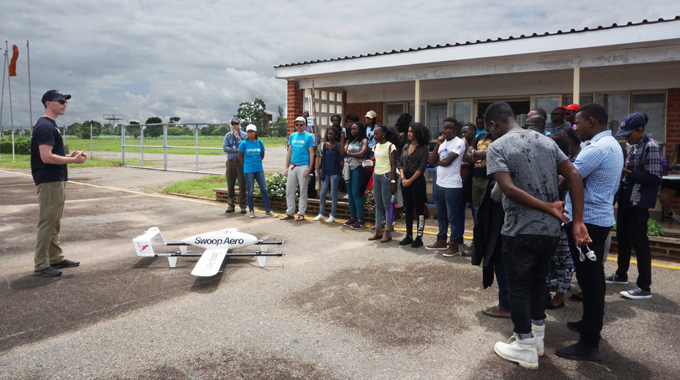The Democratic Republic of Congo (DRC) has officially launched its routine drone delivery operations to reach remote communities in the Équateur province. Through the “Drones for Health” programme, drones provide fast turnaround transport of lifesaving vaccines, medicines, and other health products as well as laboratory samples and test results to reduce the burden of infectious diseases and prevent their spread.
Led by the DRC Ministry of Health, with flight approvals from the Civil Aviation Authority, alongside partners VillageReach and Swoop Aero, the drone network, currently composed of a fleet of drones covering 22,000 km2, will deliver health products routinely and on-demand for 70 hard-to-reach health facilities (25 of which are drone landing sites), serving over half a million people. The drone program will also help to monitor vaccine-preventable diseases such as polio, measles, yellow fever, HIV, and multi-drug resistant tuberculosis, and potentially COVID-19.
The province has been making investments in its supply chain in the last several years, focusing on key areas of the National Health Development Plan. Phase 1 planning of drone integration took place in 2019 and concluded with successful demonstration flights in August 2019, and selection of Swoop Aero to conduct medical drone deliveries.
The Swoop Aero drones, operated by a fully local team, have vertical take-off and landing (VTOL) capability, and can fly beyond visual line of sight (BVLOS) at speeds of up to 115 km per hour, significantly reducing the time it takes to reach distant or difficult-to-access areas. Swoop Aero has developed and implemented drones safely and reliably in five countries, including DRC.
“The integration of drones into DRC’s health supply chain is a significant step toward equitable access to health care for the country,” said The Honorable Minister of Health of the Democratic Republic of Congo, Dr. Eteni Longondo. “The commencement of these flights means thousands of children will have increased access to immunization services. It also means that there is an additional mechanism in place for the upcoming COVID-19 vaccine distribution.”
Since late December 2020, the Drones for Health Program has conducted over 164 flights (82 round-trips) transporting 32 kg of immunization products and personal protective equipment (PPE) for 14 health facilities via 7 drone sites and returning with lab samples and reports. Two months of life-saving vaccines were delivered allowing more than 620 children to be vaccinated. To date, Swoop Aero trained a local team of 4 drone operators and 2 pilots, and 16 health facility staff. The provincial health department and VillageReach conducted additional trainings at 25 health facilities.
Delivering health products in Équateur province, a large region in northwestern DRC mostly blanketed by dense rain forest, has been a longtime challenge. The region relies heavily on the Congo River and adjacent waterways for transportation, making the ground journey from the provincial capital Mbandaka to remote communities long and difficult. Most of these communities do not have access to mobile phones or internet, rendering communications between the provincial and district health authorities and the health facilities very difficult. The drones will become a means of rapid communication in addition to a traditional means of transport, to ensure health facilities have appropriate stock of immunization products on a consistent basis, and no children go unvaccinated.
“It is a privilege to be a part of such a historic program, being the first province in DRC to use drones to address transportation challenges in our province”, said the Governor of Equateur, Bobo Boloko Bolumbu. “Much needed health products such as vaccines, masks, and lab samples will now be delivered to remote parts of the province, benefiting our communities that have also mobilized local resources in support of the program in various ways such as building floating landing areas for the drone.”
VillageReach has been working with the national and provincial government on an initiative that was launched in 2017 known as Next Generation Supply Chain (in French, it is known as Nouvelle Génération des Chaînes d’ Approvisionnement, or NGCA) to create a more efficient, effective supply chain. Integrating regular drone operations into NGCA and in Equateur continues years of work with strengthening supply chains in a large country like DRC.
“As we have seen with COVID-19, health care challenges continue to change and require responsive and flexible networks. Because investments into the health system were started at the right time by the Minister of Health,” said Freddy Nkosi, VillageReach DRC Country Director, “the supply chain system is in a mature position to have innovative solutions, such as drones, operationalized. And with the pandemic this will be incredibly important.”
In spite of the coronavirus pandemic and worldwide logistical challenge of getting the fleet of drones from Australia to DRC, Phase 2 began in early 2020 culminating into routine operations that are commemorated today, with funding from the Bill & Melinda Gates Foundation; Patrick J. McGovern Foundation; Crown Family Philanthropies; and Gavi, the Vaccine Alliance.
(Image: Swoop Aero)
For more information visit:




